Colitis is a miserable condition that causes diarrhea and other intestinal problems.
While it is usually short-lived and minor in nature, some poor pups suffer from recurrent bouts of the disease. Fortunately, there are a number of treatment options available and prevention strategies you can employ to help your pooch out.
What Is Colitis?
Colitis isn’t technically a disease; rather it is a condition. Colitis literally means inflammation of the large intestine, or colon (the suffix -itis means inflamed). It occurs in several different forms, and has a variety of causes.
The three forms it most commonly takes include:
- Acute Colitis – This type of colitis is the most common, and often occurs in response to an infection, stress or some other short-term phenomenon. Acute colitis often resolves on its own.
- Chronic Colitis – Chronic colitis occurs when your dog suffers repeated bouts of the disease, over an extended period of time (usually, two weeks is the threshold). Chronic colitis can be very taxing on an animal, and it can lead to several secondary problems.
- Histiocytic Ulcerative Colitis (HUC) – Also known as granulomatous colitis, HUC is almost entirely seen in boxers. It is often quite debilitating and very difficult to treat. Interestingly, HUC displays a number of similarities with Crohn’s disease in humans, and recent research shows that it likely occurs partially due to a problematic E. coli strain.
Dog Colitis Symptoms: Signs of Colitis in Your Canine
Colitis manifests in a variety of different ways, so it can cause a number of different symptoms. However, some of the symptoms that are commonly associated with the condition include:
- Diarrhea and Frequent Defecations – Dogs suffering from colitis often pass frequent, yet low-volume stools – it’s the classic symptom of the condition. They can also exhibit some anxiety or urgency before doing so.
- Straining – The intestinal inflammation that characterizes colitis can make it difficult for dogs to evacuate their bowels easily. This can lead to intense straining or cause the dog to feel the need to evacuate, even when there’s no feces in the intestine.
- Increased Flatulence – Intestinal inflammation and the disruption of normal gut flora that often accompanies colitis can cause your dog to pass more gas than normal. If you’ve been reaching for the Gas-X a lot lately, it’s possible that colitis is to blame. Just be aware that some dogs are gassier than others; it isn’t the quantity of gas that signals trouble, it’s a change in the amount that may indicate a problem.
- Mucus-Laden Stools – Because colitis often changes the mucus-producing activities of the large intestine, it can cause a dog’s stools to be covered in slimy mucus.
- Bloody Stools – Colitis often leads to small tears in the intestine (ulcerative colitis is actually named for the tissue erosion it causes). This often leads to bright red blood in the stool.
- Vomiting – Vomiting occasionally occurs in dogs suffering from colitis. According to the Merck Veterinary Manual, this is most common when the inflammation spreads up into the small intestine.
- Inappetence and Weight Loss – Colitis often reduces a dog’s appetite, which can cause afflicted dogs to lose weight. Nevertheless, VCA Animal Hospital characterizes colitis-caused weight loss to be rare.
The Causes of Colitis in Dogs
Colitis may occur for any of several different reasons. Some of the most common causes include:
- Stress – Dogs that are forced to endure significant amounts of stress may develop colitis. This is probably one of the more common causes of the condition, but it is also one of the easier ones to address in most cases. You’ll need to identify the cause of the stress first, but then you can take steps to eliminate the problem. Consider brushing up on your dog calming signals so that you can observe and assess what is stressing your poor pooch out!
- Intestinal Parasites – Roundworms, tapeworms, protozoans and other microorganisms can set up shop in your pet’s digestive tract, where they can cause damage. You may even see worms appear in your dog’s poop. This is one of the reasons routine de-worming is advised by most vets.
- Toxic or Otherwise Inappropriate Food – Dogs that get into the trash or dig up something suspect from the back yard may end up suffering from colitis if they eat something extremely fatty, toxic or sharp.
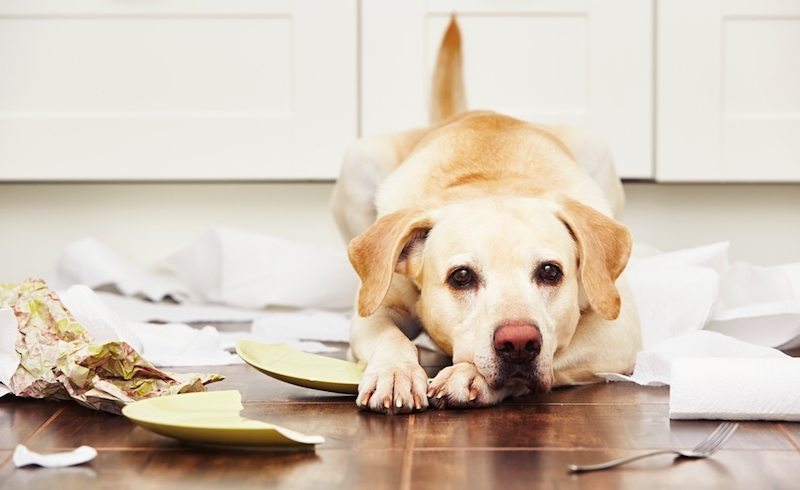
- Intestinal Trauma – Injuries to your dog’s intestines, such as those that may occur when your dog eats a bone or other dangerous item, can lead to colitis.
- Inflammatory Bowel Disease (IBD) – Some dogs suffer from canine autoimmune diseases that cause the intestines to overreact to the presence of some foods. IBD is often referred to as a “primary inflammatory diseases,” because it causes the inflammation directly, rather than trauma or toxic food which leads to inflammation.
- Infections – Infections can often irritate the lining of your pet’s colon, resulting in the symptoms associated with colitis. A number of different organisms can cause infections, including viruses, bacteria and fungi.
- Food Allergies or Intolerances – Most dog food allergies manifest in the form of itchy skin, paws and ears. However, some foods may also cause an allergic reaction in your pet’s intestine. Colitis originating from a particular food are often relatively easy to treat by removing the offending item from your dog’s diet.
What to Expect from Your Vet When it Comes to Colitis
Dogs occasionally get upset tummies, just like people do. Usually, this is no cause for concern.
However, it is important to seek out veterinary care anytime your dog has long-term gastrointestinal disturbances (those lasting longer than about 24 hours or so), or passes blood in his stool.
These symptoms can indicate a potentially serious problem, necessitating prompt treatment.
When you arrive at the vet, he or she will probably begin by taking a detailed history and recording your dog’s basic information and vitals. The vet will likely inquire about any recent travel or time spent around other dogs, and encourage you to share anything out-of-the-ordinary that has happened recently, such as your dog getting into the trash.
If colitis is suspected, your vet may first begin by recommending a 24-hour fast, followed by a diet of bland foods to see if that fixes the problem. He or she may also recommend probiotics, worming medications, or antibiotics.
However, if none of those strategies prove helpful, the vet may perform any of the following diagnostic tests to help figure out the problem:
Fecal Analysis – By testing your dog’s feces, the vet may be able to identify the cause of your dog’s problem. For example, fecal smears and fecal floatations can reveal the presence of parasites or their eggs, fecal cultures can help identify the bacteria present, and gross examination may reveal blood or mucus, which can provide further diagnostic value. (For the record: “Gross” in this sense means viewing it without a microscope, though looking at doggo-doodoo is certainly gross in the traditional sense too).
Ultrasound –Ultrasound technology utilizes sound waves to produce a “picture” of your dog’s intestines. This can help your vet to inspect your dog’s intestinal tract and get to the bottom of your dog’s problem.
X-Ray – X-rays are a good way to ensure that your dog is not suffering from an obstruction, injury or abnormality that is causing his symptoms. X-rays aren’t the cheapest service in the world, but they provide a non-invasive way for your vet to examine your dog’s internal anatomy.
Blood Tests – Blood tests provide a wealth of information in a fairly non-invasive manner, so your vet may take some of Fido’s blood during the visit. it is usually one of the first diagnostic tests they’ll perform. Blood tests can provide information about your dog’s kidney and liver function, and they can also be used to determine if your dog is battling an infection.
Endoscopic Examination – If your vet needs to directly visualize and inspect your dog’s intestines, he may perform an endoscopic procedure, in which a long, thin, flexible camera is inserted into your (sedated) dog’s rectum. This will allow your vet to see any wounds, ulcers or malformations and show them to you as well.
Biopsy – In some cases, your vet may need to remove a small amount of tissue from your dog’s colon for further inspection and analysis. This can normally be performed with endoscopic tools inserted through your dog’s rectum while under sedation.
Treating Colitis in Dogs: Is There a Cure?
There isn’t necessarily a “cure” for colitis in dogs, but there are a number of treatment options that can help most canines feel better. Acute colitis often resolves on its own or with only the simplest care, but chronic or ulcerative varieties of the condition can require medications or elaborate procedures.
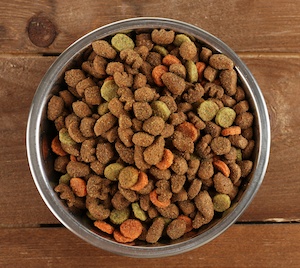
- 24-Hour Fast – This is often one of the first thing a veterinarian will recommend, as it gives your dog’s intestines a bit of a rest. Once the fast is over, high-fiber foods are often recommended to help normalize the digestive process.
- Dietary Changes – Some dogs will experience relief through dietary manipulation. Typically, veterinarians will recommend switching dogs with chronic colitis to diets that are easy on the stomach, and consist of things like boiled chicken and steamed brown rice. Some dogs respond positively to increased fiber content in their diet, while others respond better to reduced fiber content.
- Probiotics – Beneficial bacteria normally inhabit a healthy colon, but the inflammation and rapid expulsion of food can reduce these bacterial populations. Probiotics are commercially packaged versions of these bacteria, and they are found in supplement form as well as inside some common dog foods. Probiotics can help outcompete harmful bacteria and protect the delicate intestinal lining.
- Antibiotics – If your dog’s colitis has been caused by a bacterial infection, or if your vet thinks that the bacteria in your dog’s intestines are out-of-balance, dog antibiotics may be used to wipe out the harmful bugs. Probiotics may be recommended following antibiotic trials, as some antibiotics kill the good bacteria along with the bad.
- Anti-Inflammatory Medications – If your dog’s inflammation is severe, your vet may prescribe anti-inflammatory medications to help reduce the swelling and pain associated with the condition.
- Surgery – In extreme cases, your vet may need to remove a portion of your dog’s colon or repair extensively damaged areas. This is obviously not a desirable outcome, and it illustrates the importance of rapid treatment for colitis.
Prevention Is Key For Stopping Canine Colitis
For the average dog owner, it is much smarter to focus on the prevention end of the spectrum than the treatment end. Fortunately, there are a number of strategies you can employ to help prevent your dog from dealing with colitis.
None are foolproof, but they will help improve your pup’s chances of having problem-free poops.
Keep your dog’s stress level low. Stress is one of the most common causes of colitis, so do your best to keep your dog happy and well-exercised. Ensure he gets plenty of attention and affection, and that he has a safe place to which he can retreat whenever he likes.
Keep your dog’s food and water dish clean. Dirty food and water dishes can serve as a buffet for bacteria. Given your dog’s intimate relationship with these items, it makes good sense to wash his dishes daily. Don’t forget to wash any other items that contact your pet’s food, such as the scoop you keep in the food bag.
Avoid wet, filthy areas when playing outside with your pup. Bacteria, fungi, viruses and parasites all lurk in wet, dirty areas like mud puddles and debris piles. While outdoor time needn’t be a sterile activity, it is wise to avoid obviously sketchy areas.
Avoid allowing your dog contact with sick dogs. Some infections are communicable, meaning that your dog could catch them from other dogs. This doesn’t mean that you shouldn’t let your (properly vaccinated) dog play with other dogs, but keep an eye out for dogs exhibiting tummy troubles, and steer your dog clear of them.
Discuss a worming protocol with your veterinarian. Most likely, your vet already treats your dog periodically for parasites, but make sure that you bring up the issue.
Avoid switching your dog’s food abruptly. Some dogs can experience intestinal dysfunction if there food is changed rapidly. To avoid this, mix increasingly larger amounts of your dog’s new food in with his new food, over the course of about one week.
***
Don’t panic if your vet explains that your dog has colitis. Most dogs probably endure a bout with the condition at some point in their lives, and as long as it doesn’t occur over a lengthy time period, it isn’t really a big deal.
Just remember to consult with your vet anytime your dog exhibits diarrhea lasting longer than 48 hours or stools containing blood.
Has your pup ever fought through a case of colitis? Let us know how your experience went. We’d love to hear about the actual cause of your pooch’s problem as well as the steps you and your vet took to get him feeling better.
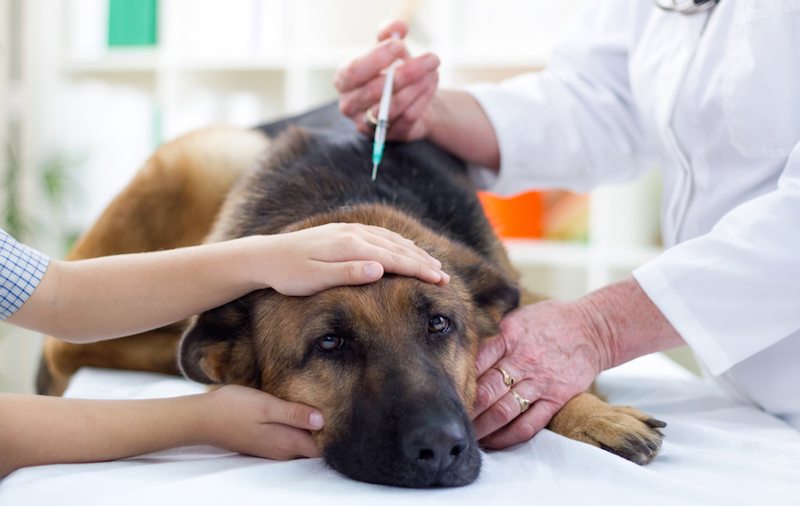




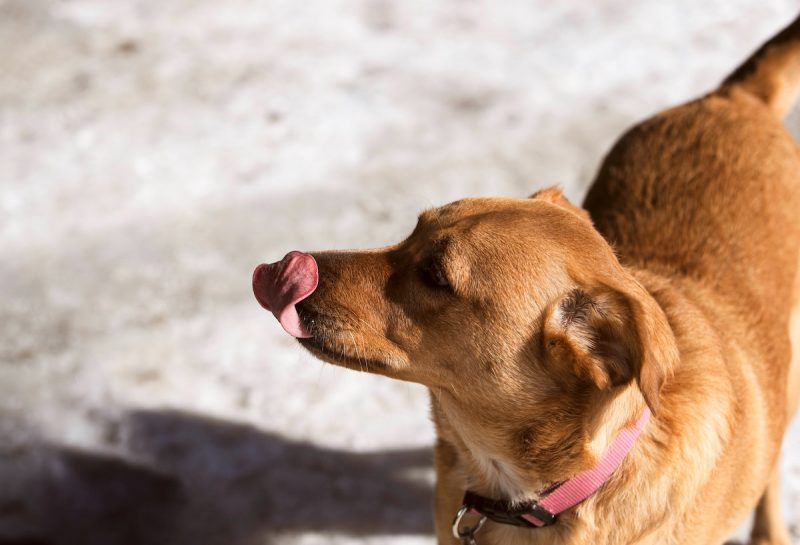
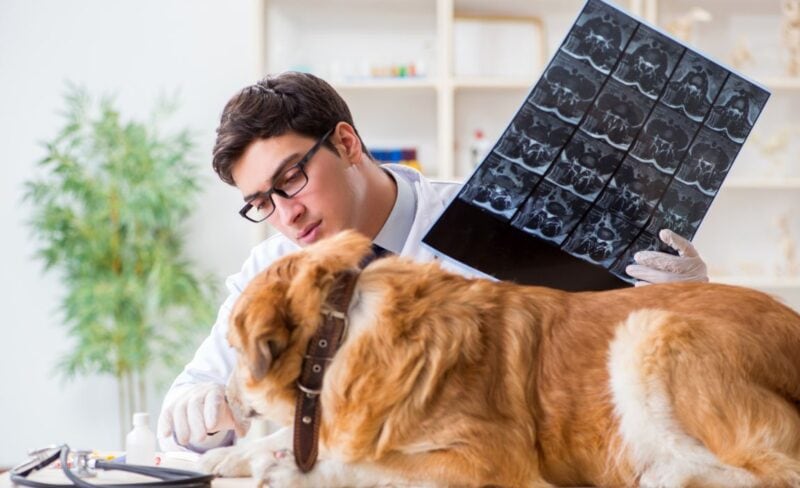


Leave a Comment